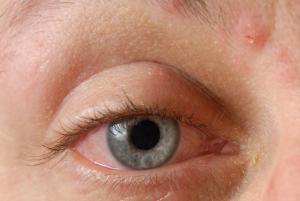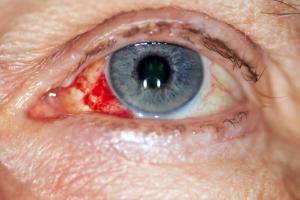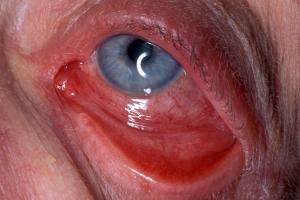Red eye
A red eye can be alarming, but is often just a sign of a minor eye condition. If it's painful, there may be a more serious problem. See your GP for advice if your red eye doesn't begin to improve after a few days.
When to get immediate medical help
Contact your GP or GP out of hours service immediately, or go to your nearest emergency department, if:
- you have a painful red eye
- you have other symptoms, including reduced vision, sensitivity to light, a severe headache and feeling sick
- you recently injured your eye – particularly if something has pierced your eye
There is information below about some common causes of a red eye.
You shouldn't rely on it to self-diagnose your condition. You should see a doctor for a proper diagnosis or for treatment.
Common causes of a painless red eye
The most likely causes of a painless red eye are minor problems such as conjunctivitis or a burst blood vessel.
These conditions don't tend to affect your vision and normally get better within a week or two.
Conjunctivitis
Conjunctivitis is inflammation (swelling and irritation) of the conjunctiva. This is the thin layer of tissue covering the eyeball and inner surfaces of the eyelids.
This causes the blood vessels on the eye to swell, making one or both eyes look bloodshot and feel gritty.
Other symptoms can include itchiness and watering of the eyes, and a sticky coating on the eyelashes.
Conjunctivitis can be caused by an infection, an allergy (for example, to pollen), or an irritant, such as chlorine or dust.

Treatment will depend on what is causing the condition. Sometimes no treatment is needed, because it may get better on its own.
Burst blood vessel in the eye
Straining, coughing or injuring your eye can sometimes cause a blood vessel to burst on the eye surface. This causes a bright red blotch.

It can look alarming, especially if you're taking medication such as aspirin or warfarin. These reduce the blood's ability to clot, which can exaggerate the redness.
It's not usually serious. It should clear up on its own within a few weeks.
Common causes of a painful red eye
If your red eye is painful, or you have other symptoms such as reduced vision, the cause may include one of the conditions listed below.
These conditions can sometimes be serious and could threaten your sight. They should be assessed by a doctor as soon as possible.
Iritis
Iritis is inflammation of the iris (the coloured part of the eye).

As well as a red eye, you may notice that:
- your eye is sensitive to light
- your vision is blurred
- you have a headache
Often, no cause is identified. Iritis can sometimes be caused by a problem with the immune system or an infection.
Iritis usually responds quickly to treatment with steroid medication to reduce the inflammation. It rarely leads to severe problems.
Acute glaucoma
Acute glaucoma is a serious condition where there is a sudden increase in pressure inside your eye.
Your eye will probably be severely red and painful. You may feel sick and see halos around lights. Your vision may be blurred or cloudy.
If your GP thinks you may have acute glaucoma, they will refer you to an eye specialist (ophthalmologist) immediately. This is because the condition could potentially lead to permanent loss of vision if it's not treated quickly.
Corneal ulcer (ulcer on the cornea)
An ulcer on the cornea (is usually caused by a bacterial or viral infection. The cornea is the clear outer layer at the front of the eyeball.
It can cause the eye to become red and sensitive to light. It can feel like there's something in your eye.
Bacterial corneal ulcers are usually seen in people who wear contact lenses. Viral corneal ulcers are often seen in people who often get cold sores.
If your GP thinks you have a corneal ulcer, they will refer you to an eye specialist for treatment.
A scratch to the cornea or particle in the eye
A red and painful eye can sometimes be caused by a particle, such as a piece of grit, getting in your eye.
If there's something in your eye, your GP or a hospital doctor at an emergency department will try to remove it.
If the particle has scratched your eye, it may feel a bit uncomfortable when the anaesthetic eye drops have worn off.
You may be given antibiotic eye drops or ointment to use for a few days to reduce the risk of infection while it heals.
More useful links
The information on this page has been adapted from original content from the NHS website.
For further information see terms and conditions.